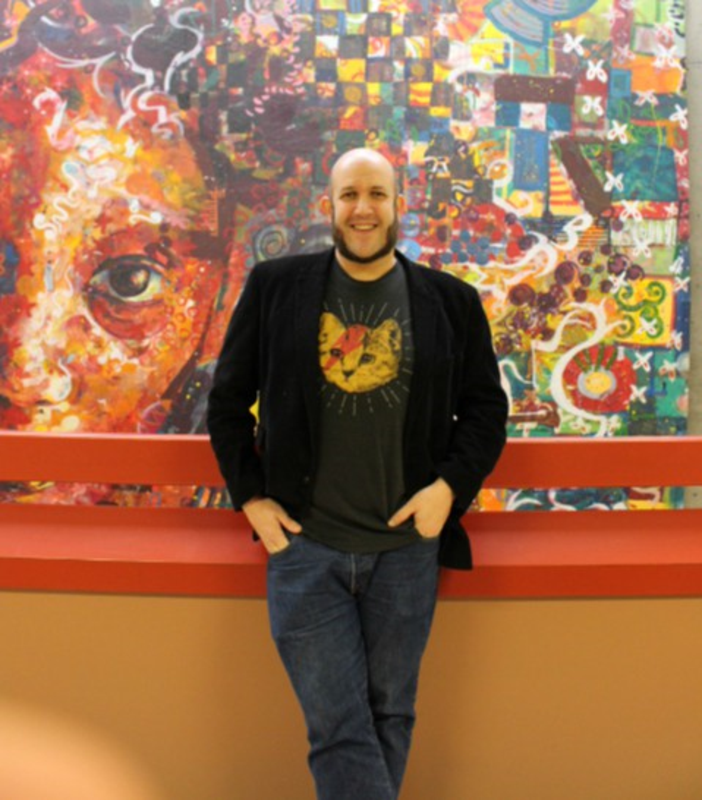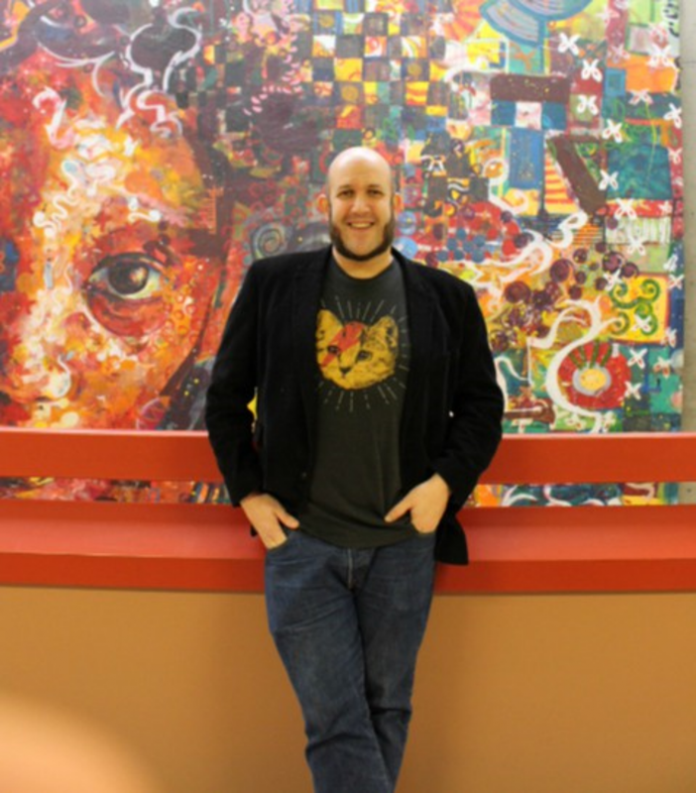 Billeh Nickerson is UFV’s 2018 Writer in Residence. Billeh is the author of five books, including The Asthmatic Glassblower, Let Me Kiss It Better, McPoems, Impact: The Titanic Poems, and Artificial Cherry, and is a former editor for Prism International and Event. Previously, Billeh was writer in residence for Queen’s University in Kingston, Ontario, as well as at Berton House in Dawson City.
Billeh Nickerson is UFV’s 2018 Writer in Residence. Billeh is the author of five books, including The Asthmatic Glassblower, Let Me Kiss It Better, McPoems, Impact: The Titanic Poems, and Artificial Cherry, and is a former editor for Prism International and Event. Previously, Billeh was writer in residence for Queen’s University in Kingston, Ontario, as well as at Berton House in Dawson City.
As the writer in residence, Billeh will host guest lectures in writing classes, participate in writing workshops and festivals in the Fraser Valley, write the foreword for UFV’s literary magazine the Louden Singletree, and will write blog posts for the English department’s blog, Write of Passage.
Between January 22 and February 5, you can catch Billeh in his office, D3009 from 10 a.m. – 4 p.m. on Mondays, and 10 a.m. – 2 p.m. Tuesdays. After reading break, from February 20 to March 28, he’ll be on campus 10 a.m. – 2 p.m. on Tuesdays, and 10 a.m. – 4 p.m. on Wednesdays.
What first prompted you to start writing poetry?
To be honest, I’m not 100 per cent sure. I remember once in high school I was walking and writing this terrible poem about mirrors and not being understood, and now reflecting I just think “Oh my god, I was an early emo.” I guess I started becoming more serious about that in high school when I realized that you could share stuff, it was just another way of conversing. I was known to read poems to people after they’d eaten cafeteria food, because when people eat, they tend to not run as fast. They have to digest, so it’s the perfect time to grab them.
Did you know then that you’d want to write poetry books?
I didn’t even know what that was; I had no concept of what a literary journal was, it just seemed so removed. Most of the stuff we read is dead white dudes. I grew up in Langley, and my last year of high school I worked at a friggen McDonald’s, so that wasn’t the career path I was thinking by any means.
I love hearing the writing processes of different people, I know writers vary drastically in how they do it. What’s your writing process, how do you go about it? Any weird rituals or innovative techniques?
It’s changed; I used to be a night writer, and I blame my cats. I adopted two young cats and they wanted my attention. It was hard to focus, so I’ve started to become a daytime writer, which is strange. And I’ve actively gone back to journals more than computers. I’ll just kind of barf onto the page, and then I can go back, and then go onto the computer. But that was great, doing that. I went to London, England, I had a friend who had this place, and he was going to be gone for a while, and I was like “Yay!” I walked every day for a couple of hours, and then I wrote. And what an amazing city; you go to a museum every day, you walk around, you write, and there was no pressure. That was wonderful.
A lot of your poetry leans towards humour, I’m thinking of Artificial Cherry, but I hear that most of your collections have humour in them. Would you say using humour in writing makes it easier to talk about certain topics?
It can. I have a lot of humour, but the humour quite often is also connected to what I call “cheeky sweet,” or bitter sweet. You can get into the most serious topics, finally, when people let their guard down with the humour. So that’s the best time. Metaphorically, if you’re going to pull a knife on someone, do it when they’re laughing. It was interesting when I was doing the Titanic book, because I tried to have some funny poems, but it just felt weird. I’m sure people were laughing on the Titanic, but it just felt too forced, and it didn’t feel organic. So that was the strange one for me, to not be able to have that, and that was hard to do readings, because I’m normally a humourist, and then I would go up there, and I would read these really depressing poems, and people were like “Oh, okay,” because it’s not what they expected.
We see a lot of personal expression in your poetry, as to be expected. Do you find it hard to write about deeply personal thoughts and experiences, knowing that thousands of people are going to read it?
I mean, there’s some things now that I’m like “Oh, god, do I need my students knowing that?” But you’ve got to be true, part of being authentic is being honest. You’re going to expose parts of yourself. But it’s strange, as you get older and have different experiences, different things bother you. Look at the times we’re in right now, the truth is under attack. If I’m not truthful with my own readers, even if I’m writing personas — it’s weird, because my first book is called The Asthmatic Glassblower, and I’m not asthmatic. To this day — it’s been 20 years — there’s people coming up and telling me their asthma stories, and I’m like “Great, but I’m not asthmatic.” The voice of that character… I made that up. You can never tell.
What are the defining moments in your life that have shaped your poetry?
Oh jeez, the pivotal moments. I think growing up in Langley, coming out, and realizing the possibilities of poetry — and that’s something that I keep learning. The possibilities keep changing, and that’s always really pivotal, like “Oh, I can do this, I can do that.” Working at McDonald’s, falling in love, having my heart broken — some of the basic ones.
I love that you talk so freely about sexuality in your poetry, especially in Artificial Cherry. Has poetry helped you be more open to talking about it, or were you pretty open talking about it before?
I don’t know what came first — kind of like the chicken or the egg — or if it was at the same time. I wrote a column with Extra West, which was the gay paper across the country, but there was one based in Vancouver, and that was pretty pivotal. It allowed me to explore, and make mistakes. I had 500 words, and I was able to put this stuff out there. I think having that, along with the poetry, allowed me to do that, but I’m not big on silences or shame and all that.
That’s where the humour works best; I get to debunk shame, or show people their bias. The Wayne Gretzky poem was a big deal for me for my first book, because CBC would play it late at night, and it was published everywhere. That’s probably one of the poems I’m most famous for. I was worried, the first time I went to Alberta, and I read the Wayne Gretzky poem, which was an erotic fantasy about Gretzky. I thought “Oh, I’m going to get the crap kicked out of me.” But all these guys, these bros, were coming up to me like “Bro, that’s totally a funny poem, thank you so much.” I learn too.
So it really affects a wide audience, then, because it’s not just the gay community who find interest in your poems.
Oh yeah. And women buy books. For me, lesbians have been the saviour of my career, because they get it, they’re political. Men could buy more books. Even straight women, they’re the ones buying the books, they’re the ones being more open. And I’m quite aware of that.
Some poets want sexuality to be the main focus of the work, the main theme, and some see it as an afterthought, like “Hey, this is who I am,” and it works into the poetry naturally. Would you say you fall into the first or the second category?
It depends on the project. I don’t really think the sexuality stuff comes up in McPoems or Impact at all. I’m a weird bird in the sense that I was a competitive curler, so I have that, and I have all these really random hobbies and areas of knowledge, so I think that areas of knowledge and passion inform my poetry, and because of that, my sexuality, my way of viewing the world, and some of my experiences, that’s how it plays in.
What are you trying to achieve with your poetry? Is there a central message, or do you focus on sharing your thoughts and feelings?
That’s a tough one to answer about poetry in general, because I think that each poem or each project has a different goal, or a little fascination to it. Sometimes it’s political, sometimes it’s very much about a small moment, a quiet moment, and that’s a more imagistic kind of piece. The big thing is that I totally believe that my job as a poet is to make people see the world in a new way. It’s that simple. I think a lot of writers and critics have said that kind of thing in their own words, but that is ultimately one of our responsibilities. So, that’s what I try to do. And whether it’s a cheeseburger, or the Titanic, or sexy times, or whatever, just get people to stop and consider.
What are you hoping to achieve as the writer in residence?
I’m hoping to assist people to find a new truth for themselves, or a deeper sense of their truth in their writing. It’s weird, I’m an insider in the sense that I have a long history in the Valley, but I’m an outsider to the institution. So I can ask things and try things, and try to get groups together, which is hard at any institution, so I’m hoping to be a bit of a connector.
If you could give one piece of advice to writers, what would it be?
Floss, and listen.


